- Home
- Elizabeth Gilbert
The Last American Man Page 2
The Last American Man Read online
Page 2
I met Judson Conway the first day I came to the ranch. He was the first thing I set eyes on after that long drive up that big Wyoming mountain, and I kind of fell in love with him. I didn’t fall in love with Judson like “Let’s get married!” I fell in love with him like “Mercy!” Because here was Judson Conway at that moment: slim, handsome, hidden slightly under a cowboy hat, and appealingly dusty. All he had to do was stroll by me with his sexy swagger (classically executed, in the Hollywood manner of Pardon-me-ma’am-but-I-just-came-off-a-long-ride), and I was a believer.
I was attracted to Judson because I was a girl and he was beautiful and I wasn’t friggin’ blind, but I also recognized in him an immediate commonality. Like me, Judson was twenty-two years old and a complete and thoroughgoing faker. He was no more authentically Western than his new friend Blaze. Nor were we more authentically Western than Frank Brown, the other twenty-two-year-old cowboy working on the ranch. He was a college kid from Massachusetts currently going by the moniker Buck. And then there was our head cowboy Hank, who’d always holler, “Let’s pound leather, y’all!” when it was time to ride out, but whose father happened to be the assistant attorney general of Utah. We were all putting on the same show.
But Judson was my favorite, because he enjoyed the show better than anyone. He did have the slight cultural advantage of at least being from the South, so he could drawl. He was so damn cool. Walt Whitman would’ve loved how Judson was living. He was mastering marksmanship and oarsmanship, but he had also traveled across America in boxcars and hitchhiked back, had kissed girls from everywhere, and had learned to be a great storyteller and a talented hunter. And so lucid a horseman! He’d taught himself tricks like swinging his body up and off his horse while it was running along, and many other diversions that weren’t entirely practical for ranch work but were most entertaining.
He and I had a ball together two years in a row, out there in Wyoming, and then we went our separate ways. But we stayed in touch. Like a good Civil War soldier, Judson corresponded eloquently and loyally by post. Never called; always wrote. And he had a lot to write about, because this was the excellent life he’d made for himself: he spent his springtimes dove-hunting at home in North Carolina, summers as a fishing guide in Alaska, autumns as an elk-hunting guide in Wyoming, and winters helping tourists catch trophy fish in the Florida Keys.
“Intent on learning how to fish saltwater and in hopes of getting a job on a charter boat,” he wrote to me, on his first trip to Florida. “I’m staying with a couple I took horseback riding one day in Wyoming. Got to talking, and here I am . . . Been spending a lot of time in the Everglades National Park, birdwatching and wrestling alligators.”
“Not making a living,” he wrote, on his first trip to Alaska, “just living.”
Judson always swore he’d come and see me sometime in New York City, where I had since moved. (“Does the Hudson have fish in it?”) But the years passed, and he didn’t swing by, and I never quite expected him to. (“Gettin’ married, huh?” he finally wrote, after a long letter of mine. “Guess I waited too long to visit . . .”) And then one day, years after we’d last spoken in person, he called. This was in itself astonishing. Judson doesn’t use telephones, not when there are perfectly good stamps to be had. But the call was urgent. He told me he was flying to New York the very next day, to visit. Just a whim, he said. Just wanted to see what a big city was like, he said. And then he added that his older brother, Eustace, would be coming along, too.
Sure enough, the Conway boys arrived the next morning. They stepped out of a yellow cab right in front of my apartment and made the most outrageous, incongruous sight. There was handsome Judson, looking like a young swain from “Bonanza.” And there, right beside him, was his brother, Davy Fuckin’ Crockett.
I knew this was Davy Fuckin’ Crockett because that’s what everyone on the streets of New York City started calling the guy right away.
“Yo, man! It’s Davy Fuckin’ Crockett!”
“Check out Davy Fuckin’ Crockett!”
“King of the wild motherfuckin’ frontier!”
Of course, some New Yorkers mistook him for Daniel Fuckin’ Boone, but everyone had something to say about this curious visitor, who moved stealthily through the streets of Manhattan, wearing handmade buckskin clothing and carrying an impressive knife on his belt.
Davy Fuckin’ Crockett.
So that’s how I met Eustace Conway.
Over the next two days, against the unlikely backdrop of New York City, I heard all about Eustace Conway’s life. One night, Judson and Eustace and I went drinking in a lowdown bar in the East Village, and while Judson kept busy dancing with all the pretty girls and telling thrilling stories of life on the range, Eustace sat in a corner with me and quietly explained how he had been living for the last seventeen years in a teepee, hidden away in the Southern Appalachian Mountains of North Carolina. He called his home Turtle Island, named for the Native American creationist legend of the sturdy turtle who carries the entire weight of the earth on his back. Eustace told me he owned a thousand acres of land back there in the woods—a perfectly contained and unspoiled basin, with a protected watershed.
It seemed curious to me that somebody who eats possum and wipes his butt with leaves could have managed to acquire a thousand acres of pristine wilderness. But Eustace Conway was, as I would discover, a most cunning man. He had amassed that property slowly and over time with money he made by going into the local school systems and talking to riveted schoolchildren about eating possum and wiping one’s butt with leaves. Land, he declared, was his only major expense in life. Everything else he needed he could make, build, grow, or kill. He hunted for his own food, drank water from the ground, made his own clothing . . .
Eustace told me that people tended to romanticize his lifestyle. Because when people first ask him what he does for a living, he invariably replies, “I live in the woods.” Then people get all dreamy and say, “Ah! The woods! The woods! I love the woods!” as if Eustace spends his days sipping the dew off clover blossoms. But that’s not what living in the woods means to Eustace Conway.
Some years ago, for instance, out hunting for his winter deer, he came upon a gorgeous eight-point buck grazing through the brush. He shot. The buck went down. Not knowing if he had killed the animal, he waited and waited to see whether it would struggle up from where it had fallen and try to run. There was no movement. Slowly, quietly, Eustace crept toward the spot where the animal had gone down and found the massive buck, lying on its side, breathing a thin, red vapor of blood through its nose. The animal’s eyes were moving; it was alive.
“Get up, brother!” Eustace shouted. “Get up and I’ll finish you off!”
The animal didn’t move. Eustace hated to see it lying there, alive and injured, but he also hated to blow off its beautiful head at pointblank range, so he took his knife from his belt and stabbed into the buck’s jugular vein. Up came the buck, very much alive, whipping its rack of antlers. Eustace clung to the antlers, still holding his knife, and the two began a wrestling match, thrashing through the brush, rolling down the hill, the buck lunging, Eustace trying to deflect its heavy antlers into trees and rocks. Finally, he let go with one hand and sliced his knife completely across the buck’s neck, gashing open veins, arteries, and windpipe. But the buck kept fighting, until Eustace ground its face into the dirt, kneeling on its head and suffocating the dying creature. And then he plunged his hands into the animal’s neck and smeared the blood all over his own face, weeping and laughing and offering up an ecstatic prayer of thanksgiving to the universe for the magnificent phenomenon of this creature who had so valiantly sacrificed its life to sustain his own.
That’s what living in the woods means to Eustace Conway.
The morning after our conversation in the bar, I took the Conway brothers on a walk through Tompkins Square Park. There, I lost Eustace. I couldn’t find him anywhere, and I got worried, concerned that he was out of his environment and therefore
helpless and vulnerable. But when I found him, he was in pleasant conversation with the scariest posse of drug dealers you’d ever want to meet. They had offered Eustace Conway crack, which he had politely declined, but he was engaging with them, nonetheless, about other issues.
“Yo, man,” the drug dealers were asking as I arrived, “where’d you buy that dope shirt?”
Eustace explained to the drug dealers that he had not, in fact, bought the shirt; he had made it. Out of a deer. He described exactly how he’d shot the deer with a black powder musket, skinned the deer (“with this very knife!”), softened the hide with the deer’s own brains, and then sewed the shirt together, using strands of sinew taken from alongside the deer’s spine. He told the drug dealers that it wasn’t such a difficult process, and that they could do it, too. And if they came to visit him in his mountain home of Turtle Island, he’d teach them all sorts of marvelous ways to live off nature.
I said, “Eustace, we gotta go.”
The drug dealers shook his hand and said, “Damn, Hustice. You something else.”
But this is how Eustace interacts with all the world all the time— taking any opportunity to teach people about nature. Which is to say that Eustace is not merely a hermit or a hippie or even a survivalist. He does not live in the woods because he’s hiding from us, or because he’s growing excellent weed, or because he’s storing guns for the imminent race war. He lives in the woods because he belongs there. Moreover, he tries to get other people to move into the woods with him, because he believes that is his particular calling—nothing less than to save our nation’s collective soul by reintroducing Americans to the concept of revelatory communion with the frontier. Which is to say that Eustace Conway believes that he is a Man of Destiny.
Eustace created Turtle Island—the thousand-acre perfect cosmos of his own design—as the ultimate teaching facility, a university-in-the-raw, a wild monastery. Because, after years of studying primitive societies and after countless experiences of personal transformation within the wilderness, Eustace has formed a mighty dogma. He is convinced that the only way modern America can begin to reverse its inherent corruption and greed and malaise is by feeling the rapture that comes from face-to-face encounters with what he calls “the high art and godliness of nature.”
It is his belief that we Americans, through our constant striving for convenience, are eradicating the raucous and edifying beauty of our true environment and replacing that beauty with a safe but completely faux “environment.”What Eustace sees is a society steadily undoing itself, it might be argued, by its own over-resourcefulness. Clever, ambitious, and always in search of greater efficiency, we Americans have, in two short centuries, created a world of push-button, round-the-clock comfort for ourselves. The basic needs of humanity—food, clothing, shelter, entertainment, transportation, and even sexual pleasure—no longer need to be personally labored for or ritualized or even understood. All these things are available to us now for mere cash. Or credit. Which means that nobody needs to know how to do anything anymore, except the one narrow skill that will earn enough money to pay for the conveniences and services of modern living.
But in replacing every challenge with a shortcut we seem to have lost something, and Eustace isn’t the only person feeling that loss. We are an increasingly depressed and anxious people—and not for nothing. Arguably, all these modern conveniences have been adopted to save us time. But time for what? Having created a system that tends to our every need without causing us undue exertion or labor, we can now fill these hours with . . . ?
Well, for one thing, television—loads of it, hours of it, days and weeks and months of it in every American’s lifetime. Also, work. Americans spend more and more hours at their jobs every year; in almost every household both parents (if there are two parents) must work full-time outside the home to pay for all these goods and services. Which means a lot of commuting. Which means a lot of stress. Less connection to family and community. Fast-food meals eaten in cars on the way to and from work. Poorer health all the time. (America is certainly the fattest and most inactive society in history, and we’re packing on more pounds every year. We seem to have the same disregard for our bodies as we do for our other natural resources; if a vital organ breaks down, after all, we always believe we can just buy a new one. Somebody else will take care of it. Same way we believe that somebody else will plant another forest someday if we use this one up. That is, if we even notice that we’re using it up.)
There’s an arrogance to such an attitude, but—more than that— there’s a profound alienation. We have fallen out of rhythm. It’s this simple. If we don’t cultivate our own food supply anymore, do we need to pay attention to the idea of, say, seasons? Is there any difference between winter and summer if we can eat strawberries every day? If we can keep the temperature of our house set at a comfortable 70 degrees all year, do we need to notice that fall is coming? Do we have to prepare for that? Respect that? Much less contemplate what it means for our own mortality that things die in nature every autumn? And when spring does come round again, do we need to notice that rebirth? Do we need to take a moment and maybe thank anybody for that? Celebrate it? If we never leave our house except to drive to work, do we need to be even remotely aware of this powerful, humbling, extraordinary, and eternal life force that surges and ebbs around us all the time?
Apparently not. Because we seem to have stopped paying attention. Or this is what Eustace Conway perceives when he looks around America. He sees a people who have fallen out of step with the natural cycles that have defined humanity’s existence and culture for millennia. Having lost that vital connection with nature, the nation is in danger of losing its humanity. We are not alien visitors to this planet, after all, but natural residents and relatives of every living entity here. This earth is where we came from and where we’ll all end up when we die, and, during the interim, it is our home. And there’s no way we can ever hope to understand ourselves if we don’t at least marginally understand our home. That is the understanding we need to put our lives in some bigger metaphysical context.
Instead, Eustace sees a chilling sight—a citizenry so removed from the rhythms of nature that we march through our lives as mere sleepwalkers, blinded, deafened, and senseless. Robotically existing in sterilized surroundings that numb the mind, weaken the body, and atrophy the soul. But Eustace believes we can get our humanity back. When we contemplate the venerable age of a mountain, we get it. When we observe the superb order of water and sunlight, we get it. When we experience firsthand the brutal poetry of the food chain, we get it. When we are mindful of every nuance of our natural world, we finally get the picture: that we are each given only one dazzling moment of life here on Earth, and we must stand before that reality both humbled and elevated, subject to every law of our universe and grateful for our brief but intrinsic participation within it.
Granted, this is not a radical concept. Every environmentalist in the world operates on a philosophy based on these same hypotheses. But what sets Eustace Conway apart from every other environmentalist is the peculiar confidence he’s had since earliest childhood that it is his personal destiny to snap his countrymen out of their sleepwalk. He has always believed that he alone has this power and this responsibility, that he was to be the vessel of change. One man, one vision.
And this was his precise vision—that, one by one,Americans would come to his mystical utopia in the woods. There, under his guidance, they would shed the frailty, ignorance, and pettiness brought about by their contemporary upbringing. Using his charisma as a lure, he would lead people back into the wilderness, uncoil their blindfolds, point them toward the stunning vista of the unspoiled frontier, and say, “Behold!” Then he would stand back and watch the awakening.
Eustace always envisioned groups of children coming to participate in primitive summer camps, but he would also welcome adults— apprentices—who, for extended periods of time, would seriously study a natural way of life under his leade
rship. Of course he knows it’s impossible to drag every single American into the woods with him, which is why he is also committed to going out into the world with his message and delivering the woods directly to the people himself—carrying the very smell of the wilderness in his hair and on his skin and within his words. He would preach and teach his doctrine in every school, at every state fair, in every mall and parking lot and gas station he could find. He would passionately speak to any businessman, baby-sitter, housewife, hooker, millionaire, and crackhead in America.
With Eustace’s energy and through his example—he has always been certain of it—Americans would gradually be transformed. They would grow and learn and once again be strong and resourceful. Then they would leave Eustace’s side and disseminate their newfound knowledge among their brethren. In this evangelical manner, Eustace Conway’s vision of perfect concordance with nature would spread and spread across families, towns, counties, and states until we would all be living like Eustace—growing our food, fabricating our clothes, making fire with two sticks, and recognizing our blessed humanity. Thus both our grand nation and our sacred planet would be saved.

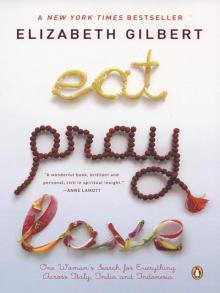 Eat, Pray, Love
Eat, Pray, Love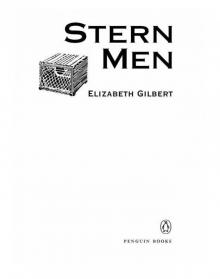 Stern Men
Stern Men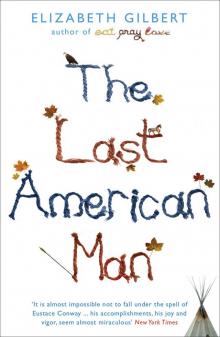 The Last American Man
The Last American Man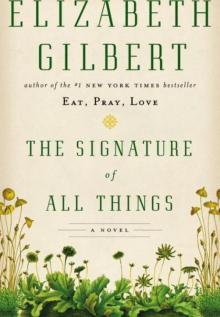 The Signature of All Things
The Signature of All Things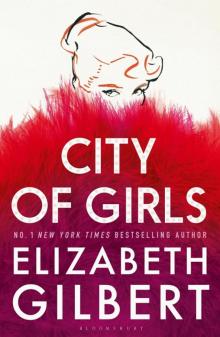 City of Girls
City of Girls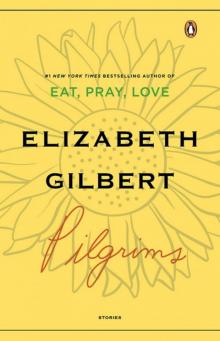 Pilgrims
Pilgrims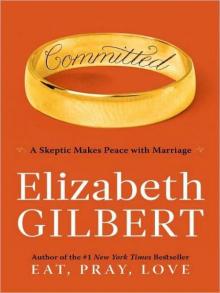 Committed: A Skeptic Makes Peace With Marriage
Committed: A Skeptic Makes Peace With Marriage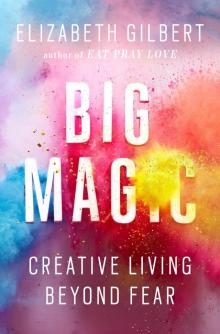 Big Magic
Big Magic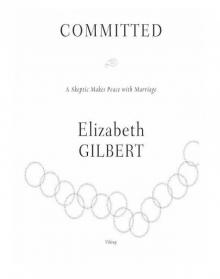 Committed
Committed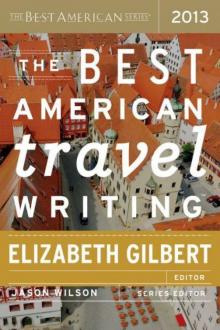 The Best American Travel Writing 2013
The Best American Travel Writing 2013